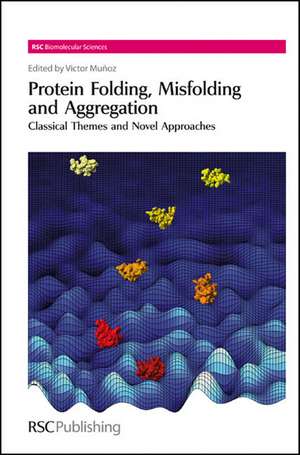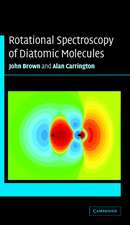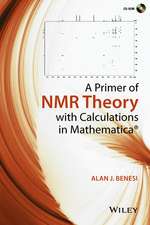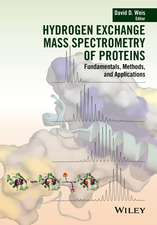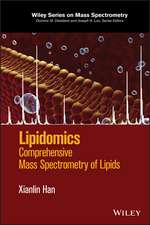Protein Folding, Misfolding and Aggregation: Classical Themes and Novel Approaches: RSC Biomolecular Sciences
Autor Royal Society of Chemistry Editat de David M.J. Lilley, Marius Cloreen Limba Engleză Hardback – 31 aug 2008
Protein folding and aggregation is the process by which newly synthesized proteins fold into the specific three-dimensional structures defining their biologically active states. It has always been a major focus of research in biochemistry and has often been seen as the unsolved second part of the genetic code. In the last 10 years we have witnessed a quantum leap in the research in this exciting area. Computational methods have improved to the extent of making possible to simulate the complete folding process of small proteins and the early stages of protein aggregation. Experimental methods have evolved to permit resolving fast processes of folding reactions and visualizing single molecules during folding. The findings from these novel experiments and detailed computer simulations have confirmed the main predictions of analytical theory of protein folding. In summary, protein folding research has finally acquired the status of a truly quantitative science, paving the way for more exciting developments in the near future. This unique book covers all the modern approaches and the many advances experienced in the field during the last 10 years. There is also much emphasis on computational methods and studies of protein aggregation which have really flourished in the last decade. It includes chapters in the areas that have witnessed major developments and are written by top experts including:computer simulations of folding, fast folding, single molecule spectroscopy, protein design, aggregation studies (both computational and experimental). Readers will obtain a unique perspective of the problems faced in the biophysical study of protein conformational behaviour in aqueous solution and how these problems are being solved with a multidisciplinary approach that combines theory, experiment and computer simulations. Protein Folding, Misfolding and Aggregation Classical Themes and Novel Approaches is essential reading for graduate students actively involved in protein folding research, other scientists interested in the recent progress of the field and instructors revamping the protein folding section of their biochemistry and biophysics courses.
Din seria RSC Biomolecular Sciences
- 14%
 Preț: 1028.49 lei
Preț: 1028.49 lei - 14%
 Preț: 1127.28 lei
Preț: 1127.28 lei - 14%
 Preț: 1123.82 lei
Preț: 1123.82 lei - 5%
 Preț: 1236.31 lei
Preț: 1236.31 lei - 14%
 Preț: 1129.77 lei
Preț: 1129.77 lei - 14%
 Preț: 1193.61 lei
Preț: 1193.61 lei - 14%
 Preț: 1029.33 lei
Preț: 1029.33 lei - 14%
 Preț: 1193.61 lei
Preț: 1193.61 lei - 27%
 Preț: 2006.97 lei
Preț: 2006.97 lei - 14%
 Preț: 1028.80 lei
Preț: 1028.80 lei - 5%
 Preț: 1143.04 lei
Preț: 1143.04 lei - 14%
 Preț: 1030.44 lei
Preț: 1030.44 lei - 14%
 Preț: 1129.25 lei
Preț: 1129.25 lei - 14%
 Preț: 1127.10 lei
Preț: 1127.10 lei - 14%
 Preț: 1134.26 lei
Preț: 1134.26 lei - 9%
 Preț: 923.16 lei
Preț: 923.16 lei - 9%
 Preț: 923.25 lei
Preț: 923.25 lei - 9%
 Preț: 1006.97 lei
Preț: 1006.97 lei - 9%
 Preț: 922.68 lei
Preț: 922.68 lei - 9%
 Preț: 922.46 lei
Preț: 922.46 lei - 9%
 Preț: 1006.03 lei
Preț: 1006.03 lei
Preț: 1029.45 lei
Preț vechi: 1197.04 lei
-14% Nou
Puncte Express: 1544
Preț estimativ în valută:
197.05€ • 214.11$ • 165.63£
197.05€ • 214.11$ • 165.63£
Carte tipărită la comandă
Livrare economică 21 aprilie-05 mai
Preluare comenzi: 021 569.72.76
Specificații
ISBN-13: 9780854042579
ISBN-10: 0854042571
Pagini: 288
Dimensiuni: 162 x 238 x 22 mm
Greutate: 0.59 kg
Editura: Royal Society Of Chemistry
Seriile RSC Biomolecular Sciences, RSC Biomolecular Sciences (unnumbered)
ISBN-10: 0854042571
Pagini: 288
Dimensiuni: 162 x 238 x 22 mm
Greutate: 0.59 kg
Editura: Royal Society Of Chemistry
Seriile RSC Biomolecular Sciences, RSC Biomolecular Sciences (unnumbered)
Cuprins
Preface: Classical Themes and Novel Approaches in Protein Folding and Aggregation; Chapter 1: The Helix as the Simplest Protein Folding Model; Helix-Coil Theory, Stability and Design; Chapter 2: Kinetics and Mechanisms of -Helix Formation; Chapter 3: Protein Folding Theory; The Folding Energy Landscape: A Primer; Chapter 4: Hydrogen Exchange Experiments; Detection and Characterization of Folding Intermediates; Chapter 5: Statistical Differential Scanning Calorimetry; Probing Protein Folding-Unfolding Ensembles; Chapter 6: Fast Protein Folding; Chapter 7: Single Molecule Spectroscopy in Protein Folding; From Ensembles to Single Molecules; Chapter 8: Computer Simulations of Protein Folding; Chapter 9: Protein Design; Tailoring Sequence, Structure and Folding Properties; Chapter 10: Protein Misfolding and -Amyloid Formation; Chapter 11: Computational Studies of Protein Aggregation; Molecular Dynamics Simulations and Bioinformatic Analysis of Scenarios for Protein Aggregation
Notă biografică
Victor Muñoz is Associate Professor in Chemistry and Biochemistry at the University of Maryland, USA and Research Professor in Biophysics at the Spanish Research Council (CSIC), Madrid, Spain. He has worked in the area of protein folding and aggregation for the last 16 years and for the last 7 years he has been involved in promoting a change from the classical biochemical to a physical paradigm in experimental protein folding.
Textul de pe ultima copertă
Protein folding is the process by which newly synthesized proteins fold into the specific three-dimensional structures defining their biologically active states while avoiding aggregation into pathogenic assemblies. It has always been a major focus of research in biochemistry and has often been seen as the unsolved second part of the genetic code. In the last 10 years we have witnessed a quantum leap in the research in this exciting area. Computational methods have improved to the extent of making it possible to simulate the complete folding process of small proteins and the early stages of protein aggregation. Experimental methods have evolved to permit resolution of fast processes of folding reactions and visualisation of single molecules during folding. As a result, the study of protein folding and aggregation has acquired a high level of technical and conceptual sophistication, in which theory, computer simulations and experiments are starting to be combined in a global approach. Protein Folding, Misfolding and Aggregation: Classical Themes and Novel Approaches includes chapters in the areas that have witnessed major developments and are written by top experts in the field. The book is unique in its scope and in its coverage of all the new developments in this area by filling a much needed gap in the current literature. Readers will obtain a unique perspective of the problems faced in the biophysical study of protein conformational behaviour in aqueous solution and how these problems are being solved with a multidisciplinary approach that combines theory, experiment, and computer simulations. RSC The book is essential reading for graduate and postdoctoral students actively involved in protein folding research, other scientists interested in the recent progress of the field, and instructors revamping the protein folding section of their biochemistry and biophysics courses.
Descriere
This unique book covers all the modern approaches and the many advances experienced in the field of protein folding and aggregation during the last 10 years.
